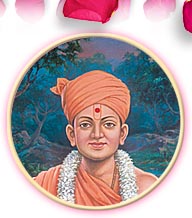|
''One
Who Serves is Mahant.''
Swami arrived at Junagadh. Once, he was busy sweeping the mandir compound. At that time, the mahant of Tarnetar came there and asked Swami, “Who is the mahant of the mandir?”
Swami modestly replied, “He will be on his seat inside.” And then Swami washed his hands and feet, came to the assembly hall and met him. He was surprised and asked, “Just now you were sweeping the grounds. Are you the mahant?”
Swami replied with a smile, “In our organization one who serves is mahant.” Then he took down his joli from the nail on the wall and showed it to the mahant. Swami had no item made from metal, even his tilakyu was made of wood. The garments he wore were made of coarse cloth. The mahant of Tarnetar was surprised to see such a detached mahant. Then Swami explained to him, “We have renounced women and wealth and therefore, our mahantship has been sustained.”
On hearing this, the mahant also felt that this is absolutely true. Among them the disciples kill the guru and occupy the throne, tempted by money and material things.
Once, accompanied by his group of sadhus and devotees, Swami was travelling in the villages around Junagadh. Swami was riding a horse and others were walking along. Some Muslims thought that if they killed the leader of the group, the Hindus would stop worshipping him. They joined the group with this malicious intention. They enquired of one or two sadhus from the group, “Who is your leader?”
The sadhus replied, “The person riding on horseback is our guru and a great sadhu.” The sadhus had replied innocently, thinking that they were enquiring for the darshan of Swami. But the Muslims immediately rushed to the horse and holding the reins they asked Swami, “Are you the leader?”
“Only God is the leader whereas I am his servant,” replied Swami casually with a smile.
The Muslims thought, “Oh! He seems to be some great fakir because he considers God as the leader.” They were humbled by this. They bowed to Swami and went away.
In 1861 CE (Samvat 1917), as per his promise, Raghuvirji Maharaj went as a pilgrim to Junagadh to remain in the company of Swami. He had given up his pomp and retained only one attendant. After getting ready in the early morning, he would arrive to listen to Swami’s discourses. Seeing his spiritual inclination, Swami also talked profoundly about atma and Paramatma. After the discourse was over he would eat khichdi, which he had left to cook for his meal, and then again sit in the assembly. In this way, he had stopped caring for his body in all respects. When Swami came to know that Acharya Maharaj did not take his meals properly, he started to visit his lodgings and talked to him there. He even used to get good meals cooked for him, and then made him dine properly. In this way, since Raghuvirji Maharaj gave up all obligations, abandoned all his pomp and remained in the company of Swami with total devotion, Swami dissolved his base nature.
|






